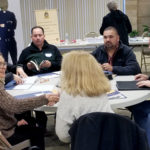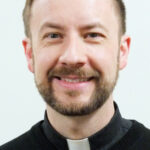Rioters taking to the streets in Ferguson and Baltimore; a 21-year-old accused of gunning down nine African Americans inside a church; millions of Syrians, uprooted and fleeing for their lives. Conflict bubbles over like a pot of boiling water. It makes us wonder, doesn’t it? Why are other people causing so many problems? Maybe we should rephrase the question: What are we doing, as individuals and communities, to contribute to conflict?
In a homily he gave during Mass last week in Quito, Ecuador, Pope Francis said “It would be facile to think that division and hatred only concern struggles between countries or groups in society. Rather, they are a manifestation of that ‘widespread individualism’ which divides us and sets us against one another.…”
The pope describes a legacy of sin lurking in the heart of human beings as the source of so much suffering in society and all of creation. But this is the world into which Jesus sends us. We can’t ignore or complain about problems that seem way beyond fixing. Instead, “we must respond by taking up the cry of Jesus and accept the grace and challenge of being builders of unity,” Pope Francis says.
He calls us to be evangelizers in the fullest sense: sharing the love, faith and hope we have been gifted with as members of the body of Christ. When we share of ourselves freely, we become ever more sensitive to the needs of others.
Pope Francis isn’t asking us to give up our individuality; that, too, is a gift from God, who knew us before he knit us in our mother’s womb. What the pope is asking is that we turn the focus away from individualism, which prioritizes “me,” and look toward those truly in need of prioritization — the poor, the marginalized, the neglected.
Work toward being more inclusive, the pope says. Avoid all forms of selfishness, build communication and dialogue; encourage collaboration. That is easier said than done. Think of the cliques that we create, from the time children are toddlers in play groups through the school years and on into adulthood in the workplace, the country club, social and civic organization and even parishes. Don’t we tend to avoid people who are atypical, the misfits? The people we’d never invite to lunch or to a class at the gym or to serve on a parish committee. What if a particular individual wants too much of our time?
While we’re pondering our relationships close to home, perhaps we should think about our attitudes towards people of different ethnic or political persuasions here or abroad. Jesus told us to love our enemies. How do we define love? How do we define enemy? Could that help us to contemplate more deeply the cause of the searing hatred of ISIS, for example?
Pope Francis speaks of our church as a missionary church constantly fostering communion with others. “When we give of ourselves, we discover our true identity as children of God in the image of the Father and, like him, givers of life; we discover that we are brothers and sisters of Jesus, to whom we bear witness,” the Holy Father said.
Later, at Pontifical Catholic University of Ecuador, he raised the question of how to inspire college students to focus not on achieving status but on recognizing a greater responsibility toward addressing the needs of the poor and concern for the environment. Personal initiatives are important, the pope points out, but those initiatives must be grounded in a sense of interconnection with our God, other people, and the earth.
Yes, we are individuals and should embrace our uniqueness as a gift from God. We should always strive for excellence. And with the inspiration of the Holy Spirit, we can move beyond ourselves, reaching out to the other, and become builders of unity.
Barb Arland-Fye











